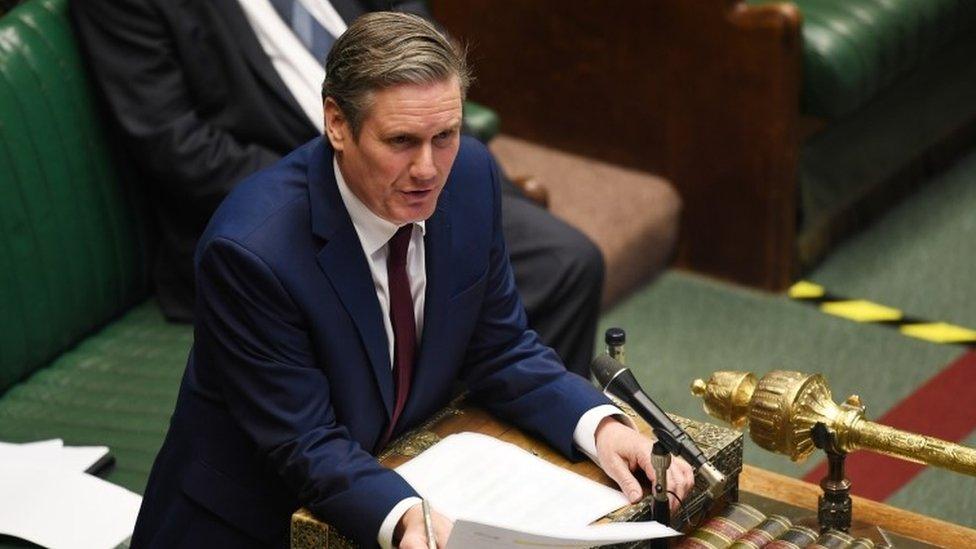PMQs: Labour leader Starmer's political distancing
- Published
- comments

In one of his first acts as Labour leader, Sir Keir Starmer announced he would not indulge in opposition for opposition's sake.
This was seen as a decisive break from his own party's recent past.
But now he wants to create more distance between the government and the opposition.
Some say they have noted a more hostile, less consensual tone towards Boris Johnson from Sir Keir.
In an interview with the Guardian, external, he has suggested that the prime minister lacks "grip". At Prime Minister's Questions today, he accused the prime minister of undermining public trust in his own government with his actions, just at the time when it is needed most.
But, in truth, Sir Keir's stated policy of "constructive criticism" had already tended to emphasise the latter of those two words at PMQs.
And his approach to today's session had as much in common with his approach before - to put down a marker in case things go wrong.
One step beyond
Sir Keir called for an exit strategy from the government at a time when some of his own MPs - and certainly grassroots members - wanted to see him clash with No 10 more robustly on issues of the day.
He now feels vindicated as he believes the lack of a strategy - "an exit without a strategy", as he puts it - is becoming apparent.
The Labour leader is determined to stay one step ahead of the government.
So, by raising questions now over the easing of lockdown while doubts remain about the alert level and the efficacy of the track and trace system, he is positioning the party to distance itself further from the government's approach if the R number goes up.
But it is true that his tone towards Boris Johnson himself is hardening.
Frustration
Labour insiders say this isn't so much the result of a strategic change, but is borne of a sense of frustration with the prime minister over recent days.
As part of the "constructive criticism" approach, the Labour leader sent a letter to Boris Johnson on 18 May about the re-opening of schools.
At PMQs, Sir Keir said he had not received a reply.
The Labour leader was also annoyed by the way advice to those who are shielding was released, without proper consultation.
And he is irritated by what he perceives as an attempt by the PM to keep shifting responsibility for the crisis away from the door of No 10 to local councils, officials, and individuals.
So, Sir Keir is attempting to ensure that if things do go wrong and there are local lockdowns and/or higher infection rates in the weeks ahead, the buck must stop at Downing Street.
And this all appears to be part of a wider narrative he has been pursuing - that the government was too slow to go in to lockdown, and potentially too cavalier in easing it.
Questions, questions
At PMQs, it is Boris Johnson's job to answer Sir Keir's questions.
But there are questions for the Labour leader too.
Some of his political opponents are finding it frustrating that it appears to be the Labour leader and not the prime minister who is having his cake and eating it.
While Sir Keir has been focussed on the government's handling of the crisis, his critics say there has been less scrutiny of what he would do instead.
For example, he has complained of a lack of consultation over the re-opening of schools.
He is also concerned about the effect the closures will have had on the educational attainment of disadvantaged pupils in particular.
But if he were prime minister, would he have led from the front and pushed for partial re-opening? Or would councils and unions have had an effective veto?
Perspiration not inspiration?
More widely though, is he prioritising perspiration over inspiration?
Sir Keir has done some heavy-lifting to make his party look like a more effective opposition and he has proved he can make Boris Johnson sweat.
His own standing in the polls has risen - but his party still lags behind the Conservatives.
So far, the more positive policies that will be necessary to rally new converts to his banner have been less apparent.
Of course, he has talked about valuing public sector workers more, and of rebuilding the economy in a fairer way after the crisis has passed.
He will seek to "win the peace".
But while we may see a laser-like focus on the government's perceived failings, Sir Keir's own vision for the UK remains hazy.